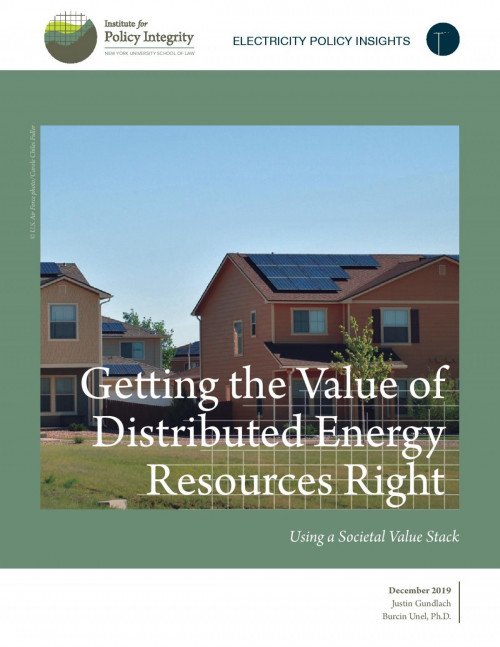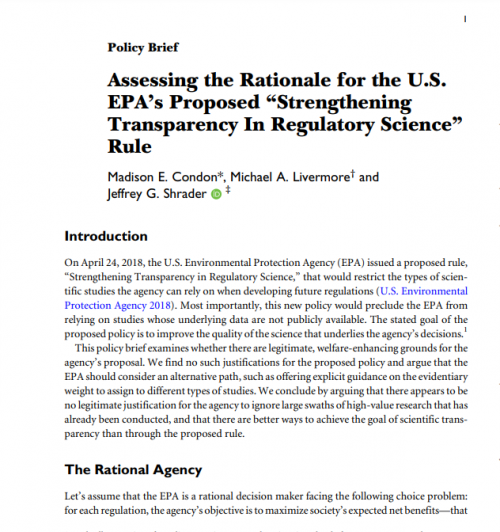-
Assessing the Rationale for the EPA’s Proposed Regulatory Science Rule
The U.S. Environmental Protection Agency (EPA) is considering a new policy that would prohibit the agency from issuing regulations that rely on studies whose underlying data are not publicly available. While the EPA claims it is pursuing this policy in the interest of transparency, we argue that such a prohibition would greatly hinder, rather than help, the rulemaking process and would likely result in undesirable regulatory outcomes that fail to maximize economic welfare.
-
Amicus Brief on NHTSA Rule Lowering Penalty for Violations of Fuel-Economy Standards
The National Highway Traffic Safety Administration (NHTSA) recently finalized a rule that significantly reduces the penalties that automakers pay for violating the corporate average fuel economy (CAFE) standards. In reducing the penalty, NHTSA rolled back an adjustment that had been made to the penalty under the Inflation Act, a statute requiring agencies to adjust civil monetary penalties to account for decades of inflation. We submitted an amicus brief in the Court of Appeals for the Second Circuit focusing on NHTSA’s faulty economic justifications for the rule, arguing that this repeal was unlawful.
-
Comments on Royal Gorge Lease Sale
The Bureau of Land Management failed to consider the climate impacts of oil and gas leasing activity in Colorado that would produce 317 million tons of carbon dioxide-equivalent over a 30-year period in upstream and downstream emissions. We submitted comments urging the agency to apply the social cost of greenhouse gases in its environmental assessment.
-
Comments on Wyoming Lease Sale
The Bureau of Land Management failed to estimate the climate impacts of leasing activity that would produce over 5 million tons of carbon dioxide-equivalent in downstream emissions on an annual basis. We submitted comments urging the agency to use the social cost of greenhouse gases in its environmental assessment.
-
Comments to the Department of Labor on Tip Pooling
The Wage and Hour Division of the Department of Labor (DOL) is proposing to implement new tip regulations under the Fair Labor Standards Act. We submitted comments asking DOL to provide a more detailed explanation of the proposed rule and improve its underlying analysis.
-

Getting the Value of Distributed Energy Resources Right
Using a Societal Value Stack
Our report notes the growing presence of distributed energy resources, like solar panels and energy storage installations, and explains how they should be compensated for providing electricity services valued by utilities and their customers. Currently, 40 states use net energy metering programs to compensate DERs. We describe a promising alternative, “value stacking,” which better reflects DERs’ value, and provide suggestions for how to implement this approach.
-
Comments to EPA on Methane Emissions from Oil and Gas Operations
The Environmental Protection Agency (EPA) proposed revisions to New Source Performance Standards for methane and volatile organic compound (VOC) emissions from the oil and natural gas sector. We submitted comments focusing on EPA’s flawed legal and economic justifications for the rule.
-
Comments to the State Department on the Proposed Keystone XL Pipeline
We submitted comments on the U.S. Department of State’s supplemental environmental impact statement for the proposed Keystone XL Pipeline project. A federal district court ruled that the agency’s original impact analysis was inadequate, failing to take all relevant information into account when projecting that the pipeline would not affect total crude oil production. The Department’s new analysis projects that the pipeline will likely increase total crude oil production by only partially offsetting production that would have occurred elsewhere under a “no action” scenario, but irrationally fails to account for this substitution effect when projecting the pipeline’s economic benefits. Our comments argue that the Department continues to violate NEPA by its lopsided treatment of the pipeline’s costs and benefits, through not only its inconsistent treatment of substitution effects but also its failure to assess the pipeline’s climate-related impacts through monetization.
-
Comments to EPA on Water Quality Trading Proposals
The Environmental Protection Agency (EPA) requested input on policy approaches to promote market-based programs that will improve water quality. We submitted comments suggesting that EPA provides additional clarity, works to avoid undermining key permitting goals, and considers using alternate market-based structures before reissuing its proposals.
-
Comments to Colorado on Participation in Centralized Electricity Markets
The Colorado Public Utilities Commission is evaluating different options for electric utility participation in centralized electricity markets, as part of the Colorado Transmission Coordination Act. We submitted comments encouraging the Commission to move the state to a centralized market, which would help accomplish energy goals and would benefit generators, utilities, and customers.







